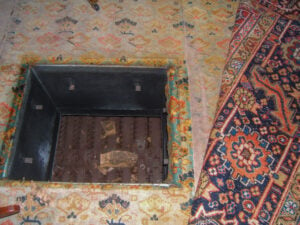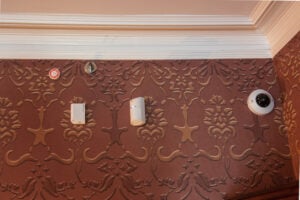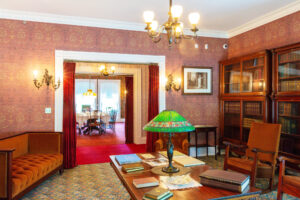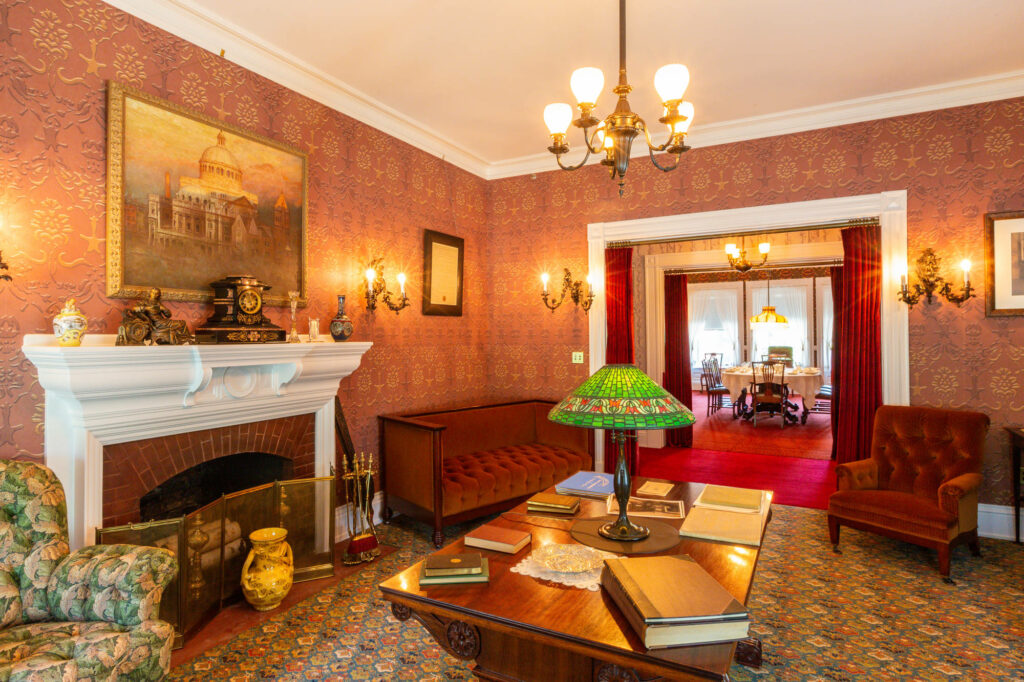In May 2024, Longyear Museum successfully completed a thorough restoration of 400 Beacon Street, the final residence of Mary Baker Eddy, the Discoverer, Founder, and Leader of Christian Science. In this online series, we reprise “‘The Dearest Spot on Earth’” from the 2024 issues of the Longyear Review, taking readers on a tour through the interior of the immaculately restored house in Chestnut Hill, Massachusetts. Each month, starting October 2024, we’re adding a new room from Part 1 of the series to the “itinerary.”
What happened in this room?
Often the first room in the house that visitors would have seen, this warm, intimate space was a favorite gathering spot for the staff before and after meals. Decorated in the rich shades of autumn and brightened by abundant natural light as well as the glow of handsome wall sconces and an overhead fixture, the space invites quiet conversation and reading.
Mrs. Eddy subscribed to an array of magazines and newspapers for her home, including The Christian Science Monitor after it launched in 1908. While at Pleasant View, she told a friend: “We have plenty to read. We take seven newspapers and get all the news going, for I want to know what is going on and meet the error and overcome it before it develops.”1 Artwork in the room includes a reproduction of John J. Enneking’s “The Dawn,” depicting the Extension of The Mother Church, over the fireplace mantel. (See photo above.)

True colors: Long before the restoration began, Longyear staff discovered evidence of the color of the room’s original carpeting beneath a heating-vent grate in the floor. The surprisingly vivid palette was a foretaste of other visual delights that would be revealed throughout the house. When carpet-wrapped bricks used as doorstops were opened up, they were found to contain pieces of pristine original carpet that had been used as padding. In total, 19 different patterns would be reproduced by Langhorne Carpet, an artisanal mill in Penndel, Pennsylvania.
Trompe l’oeil: The wallpaper in this room was recreated by Waterhouse Wallhangings of West Hempstead, New York, based on historic photos, as no physical evidence remained of the original pattern. While the original had an embossed design, reproducing it proved prohibitively costly, so a clever 3-D illusion was created that mimics the original raised pattern. In all, Waterhouse reproduced a total of 20 wallpaper patterns throughout the house.

Systems upgrade: An upper corner of the room offers a look at the array of new systems with which the house is now equipped, including a security camera, motion sensor, glass-break sensor, VESDA smoke detection sensor, and a sprinkler head. The state-of-the-art fire-suppression system uses a mist of water droplets to extinguish or control fires, rather than a deluge of water or chemicals, thereby mitigating damage to valuable artifacts.
Next stop: THE DINING ROOM

The brief stops in these freshly interpreted period rooms touch on fascinating details about historic restoration. And they also offer a window into the daily routines of “family” life and the prayer and practical accomplishments that took place during the three years that Mrs. Eddy and her staff lived and worked here (1908–1910).
“The Dearest Spot on Earth”: Part 1
Introduction
The Library (October 2024, this page)
The Dining Room (November 2024)
Mary Baker Eddy’s Study (December 2024)
The Pink Room (January 2025)
Calvin Frye’s Office (February 2025)
“The Dearest Spot on Earth”: Part 2
Introduction
The Kitchen (May 2025)
The West Room (July 2025)
Still to come:
Laura Sargent’s Room
The Sewing Room
